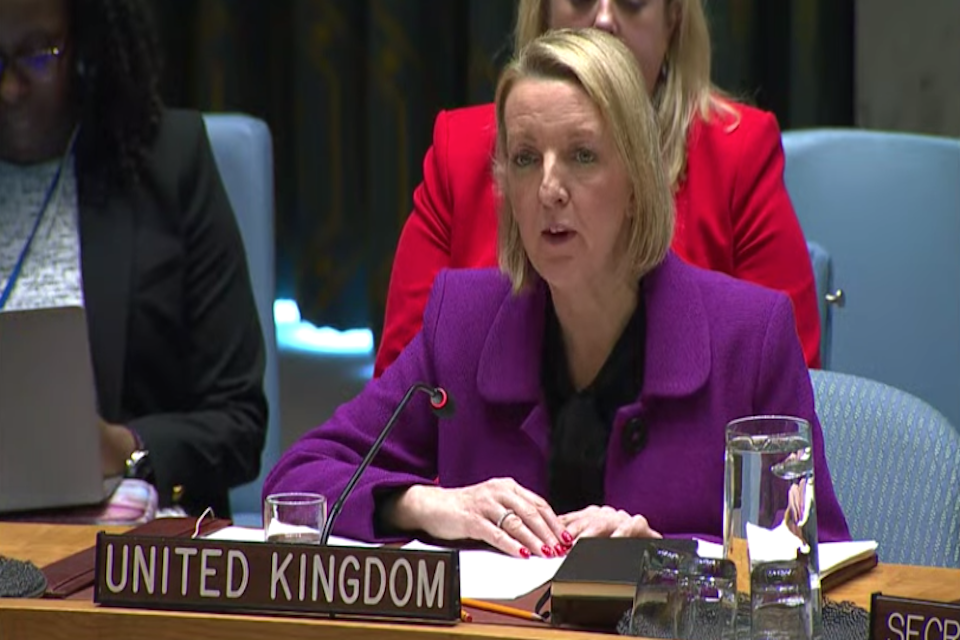Ongoing work of International Residual Mechanism for Criminal Tribunals
Statement by Susan Dickson, UK Minister Counsellor and Legal Adviser at UN, at the Security Council debate on the International Residual Mechanism for Criminal Tribunals.

Thank you, Mr President. I would like to thank the President of the International Residual Mechanism for Criminal Tribunals, Judge Carmel Agius, and Prosecutor, Mr Serge Brammertz, for their briefings to the Security Council today.
It has now been two years since the Residual Mechanism assumed full responsibility for the International Criminal Tribunal for the former Yugoslavia’s residual functions, alongside those of the International Criminal Tribunal for Rwanda. During this time, the Mechanism has continued to make commendable progress in carrying out its mandate. However, there is still more to do to guarantee the legacy of the ICTY and the ICTR.
2020 will be a significant year for the Mechanism, with their ambitious plans to conclude the Stanišić and Simatović retrial and Mladic appeal at their Hague branch and the Ingabatware and Turinabo et al. cases in Arusha. This will be in addition to their other mandated functions. We commend the ongoing work to find efficiencies and to harmonise and apply the most effective practices and approaches across the branches, including the unified judicial database, making it a truly unified institution.
The United Kingdom will continue to support the Mechanism for the remainder of its mandate. However, there is much to do since, as well as ongoing cases among other things, witnesses need protection, missing persons need to be found and domestic prosecutions need assistance. The Mechanism will need the ongoing support of Member States to ensure its mandated functions are completed.
Mr President, I am pleased to note that the process for appointing a successor to Judge Ben Emmerson, for whose contribution the United Kingdom was grateful, is well underway, and we hope will be concluded soon, bolstering the judicial roster of the Mechanism. At this point, may I also take opportunity to thank Peru for its effective chairing of the informal Working Group of International Tribunals.
Mr President, we congratulate the Mechanism on the successful conclusion of its first review hearing and welcome the outcome in the Ingabatware case. We also welcome the subsequent indictments against Ingabatware and the five accused in the Turinabo et al. case. It is vital that witnesses are protected and the integrity of the proceedings conducted by the Mechanism is maintained. We therefore welcome these important steps to hold accountable those who interfere with witnesses. We note the decision yesterday, mentioned by the President, that the Ingabatware contempt case will be joined with the Turinabo et al. case, and are pleased that this will not result in a significant delay to these cases.
I would also like to remind Member States of the importance of cooperating with the Office of the Prosecutor to find the eight remaining Rwandan fugitives still at large so they can be transferred to the Mechanism without further delay. We agree with the Prosecutor that this is vital to international peace and security. Acting to apprehend fugitives must be treated as a priority by states if the painstaking work undertaken by the Prosecutor’s office is going to lead to concrete results. We also at this stage express our serious concern at denial of the Rwandan genocide as mentioned by the Prosecutor.
Turning to The Hague, we note the progress made in the Mladic and Stanišić and Simatović cases and are pleased that these are due to conclude by the end of next year.
However, despite some progress between some countries of the Western Balkans, we are disappointed that regional judicial cooperation, denial of war crimes and glorification of war criminals remain significant challenges to accountability and ending impunity in the region. When Leaders signed the Joint Declaration on War Crimes at the 2018 London Western Balkans Summit, they agreed to underline the importance of “supporting, and removing impediments to, effective regional cooperation” and to “rejecting use of hate speech and glorification of war crimes”. The United Kingdom calls on them to ensure they are taking every step possible to honour their commitments, including improved co-operation with the Mechanism.
In this week marking International Genocide Remembrance Day, it seems particularly appropriate for us all to seek to work together to try to ensure that the Mechanism makes progress in its very important work.
I thank you, Mr President.